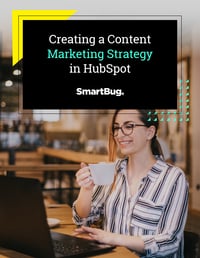
What is AEO (Answer Engine Optimization) & Its Relationship to SEO in Digital Marketing
August 28, 2025
By Maia Milas
With the introduction of AI-enabled search engine results, many marketers today are wondering: Does good ol’ search engine optimization (SEO) even matter anymore?
The short answer is yes, but the rules have changed. Optimizing your content for search engines is still incredibly important. But the reality is that many legacy SEO tactics are no longer effective—and could even be hurting your brand’s visibility.
In a recent episode of SmartBug on Tap, host Tonia Speir and SEO expert Marie Boni explore the shift from traditional SEO to answer engine optimization (AEO), driven by AI-powered search experiences such as Google’s AI overviews and ChatGPT. The following blog post will provide additional insights regarding AEO and elaborate on some of the key points from the webcast.
The Rise of AI-Driven Search and Answer Engine Optimization (AEO)
In the beginning (a.k.a. the 1990s), marketers had search engine optimization—a practice that fueled their efforts to boost brand visibility online. For more than 20 years, businesses have been seeking innovative ways to fine-tune their SEO tactics based on evolving best practices. And just as we thought we got a handle on what makes for “good” SEO, the wave of AI washed all those assumptions away.
AI tools like Google’s Search Generative Experience (SGE), Bing Copilot, and ChatGPT are changing the way people find information. We have entered the world of AEO—sometimes referred to as generative engine optimization (GEO) or generative search optimization (GSO)—which defines modern brands’ efforts to optimize content for AI crawlers that generate summaries or comprehensive answers to common search queries.
Previously, users scrolled through traditional search engine results pages (SERPs) to browse information that addressed their inquiry. But now, search engines like Google have enabled AI-assisted search— a tool that browses SERPs automatically and instantly generates an all-encompassing result based on the most relevant pages.
This is the shift we’re referring to when we say “AI broke the SERP.” Not long ago, brands prioritized being the first result listed in a SERP. Then, Google Search Ads changed the game with paid results. And now, the meaning of “high-ranking” in search results has shifted once again, this time due to AI. As a result, optimizing your content is no longer about simply addressing your audience’s needs—you need to solve users’ problems, and do it better than anyone else.
This is precisely why a strong organic content strategy is more important now than ever. Your content doesn’t just need to look good to crawlers; it needs to be good from the perspective of a large language model (LLM)—original, relevant, and high quality. Here’s Marie’s take:
“Nowadays, with the large language models, if you don't have a good brand authority, if you don't have a good reputation over the web, it's going to be more difficult to appear in buyers' eyes […] Authority matters way more than ever with LLMs. The stronger your domain level authority is, the more likely your content is to surface. [That] was already the case […] but even more now.”
6 Mistaken SEO Tactics That Are Hurting Your Brand
Needless to say, generative AI (GenAI) search tools have redefined content optimization, and what used to give brands authority may no longer be a viable strategy. Consider the following examples:
1. Keyword Stuffing and Over-Optimization
AI tends to overlook over-optimized content in favor of semantically rich, natural language. Over-optimization used to be a viable method for ranking high in SERPs, but now it signals low quality to both search engines and AI tools. The content itself—what it’s actually saying, not simply what it’s talking about—is what matters most to today’s search engines, and conventional keyword stuffing isn’t likely to get you very far with AI.
2. Content Created for Bots, Not Buyers
AI surfaces content that directly satisfies intent, which means content heavy with keywords but low on value won’t make it into AI-generated answers. In the episode, Marie reminds viewers about prioritizing quality over quantity. She brings up that large enterprises often overlook this, instead opting to pump out content for the sake of volume:
“It’s true that some SMBs (small-to-medium businesses) can outperform enterprises because they've been intentional with their SEO and content strategy. I think the reason why enterprises are not immune and can struggle is actually because […] they invest a lot in content [for] their content strategy, which is a really good thing, but they don't align it with the user's needs. [Then] it becomes writing at scale, writing all the time, a lot of content, but it's not relevant. And that's a big issue for either SEO or AEO […] When you're producing at volume, you have better chances of producing low-quality content. And that does not align with [the best] practices of today.”
3. Over-Reliance on Backlinks Alone
Don’t get us wrong, backlinks still matter, but brand authority is now much more multifaceted. AI search models factor in additional elements such as citations, brand mentions, and reputation across channels. Content that’s endorsed by numerous backlinks but lacks other optimization efforts is no longer sufficient.
4. Ignoring Semantic Clarity and Topic Coverage
Again, AI favors content that demonstrates a deep, clear understanding of topics. As Marie notes, “LLMs generate synthetic queries in order to understand what the user is saying,” which means your content must leverage precise vocabulary, rich semantic fields, and clear, hierarchical structure to rank. To achieve content that’s more forthright and less redundant, she recommends using short, impactful paragraphs that get straight to the point.
5. Corporate Jargon That Obscures Meaning
Similarly, LLMs have a preference for clear, conversational language that aligns with how real users ask questions. Using too much industry speak can lead to incomplete or incorrect summaries. Clarity, as we discussed, is your friend when it comes to AEO. Within your content, be sure to define terminology, elaborate in plain language, and keep the jargon to a minimum.
In the episode, host Tonia Speir explains that this challenge is two-fold:
“For one, you still have to optimize for those big jargony corporate words that are industry specific, but at the same time, also write your content in a way that answers the question at the level the customer's asking.”
6. Failing to Optimize or Update Older Content
Historical optimization remains critical, but freshness is now a key factor in AI search visibility. Brands can’t expect to rank or appear in AI search summaries by continuously pumping out new content pieces. And fresh content doesn't necessarily mean brand new content—businesses should actively update old content to revitalize its value. Part of the beauty of digital content is that it can be changed to reflect more current or relevant information, so brands need to take advantage of this capability.
Why Good SEO Still Matters—Now More Than Ever
AEO isn’t replacing SEO, but it is undoubtedly transforming the way search engines rank, authorize, and qualify online content. AI-enabled search has rewritten the rules of SEO, relentlessly redefining the concept of optimization as these tools continue to evolve. In other words, AI is exposing weak SEO, not killing strong SEO, which means brands with well-structured, user-centric content are already ahead of the curve.
At the end of the episode, Marie mentions that, despite the rapid evolution of AI tools, the human ability to recognize and create high-quality, innovative content shouldn’t be overlooked. Trust your expertise, she implores, and be intentional in your use of these tools. In the end, you’re still writing for human brains, just in a way that appeases the latest search LLMs—that is the challenge (and opportunity) behind AEO.
If you want to dive deeper into AEO and create more marketing impact, reach out to the team at SmartBug for help maximizing your digital content strategy.
About the author
Maia Milas "You can always edit a bad page. You can't edit a blank page." -Jodi Picoult Read more articles by Maia Milas.









